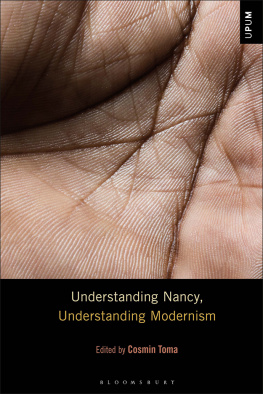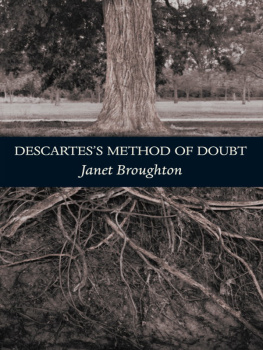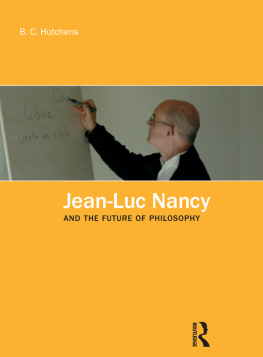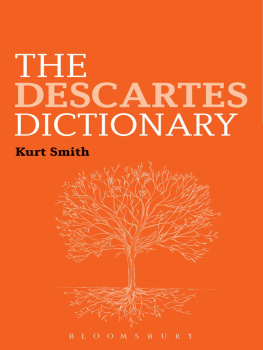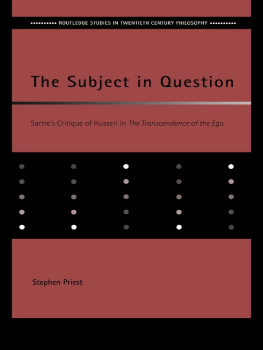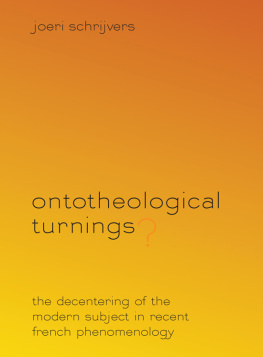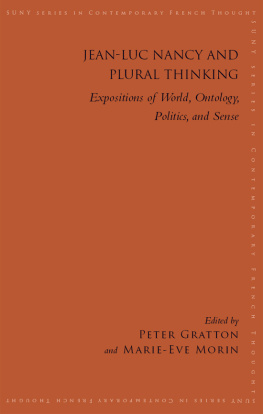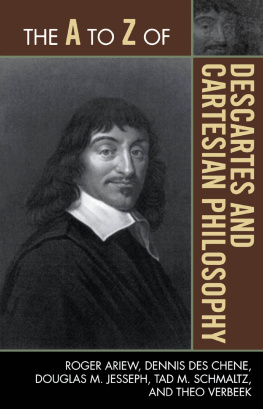Ego Sum

Copyright 2016 Fordham University Press
All rights reserved. No part of this publication may be reproduced, stored in a retrieval system, or transmitted in any form or by any meanselectronic, mechanical, photocopy, recording, or any otherexcept for brief quotations in printed reviews, without the prior permission of the publisher.
This book was originally published in French as Jean-Luc Nancy, Ego Sum , Copyright 1979 Flammarion, Paris.
Ouvrage publi avec le concours du Ministre franais charg de la CultureCentre National du Livre.
This work has been published with the assistance of the French Ministry of CultureNational Center for the Book.
Fordham University Press has no responsibility for the persistence or accuracy of URLs for external or third-party Internet websites referred to in this publication and does not guarantee that any content on such websites is, or will remain, accurate or appropriate.
Fordham University Press also publishes its books in a variety of electronic formats. Some content that appears in print may not be available in electronic books.
Visit us online at www.fordhampress.com.
Library of Congress Cataloging-in-Publication Data available online at catalog.loc.gov.
Printed in the United States of America
18 17 16 5 4 3 2 1
First edition
CONTENTS
Jean-Luc Nancy
For Marie-Eve
Of this book written thirty-five years ago, will I dare say that it has not lost any of its freshness for me? I will, provided of course that I do not read it again. Were I to read it now, I would undoubtedly find it flawed in many ways and marked by the time of its writing. But first, I avoid as much as possibleinterpret this any way you wantrereading my own texts. And second, in the case of this particular book, I am freed from the obligation and the care of rereading it in a more specific way, since it has never ceased reworking, repeating, and renewing itself within mesomewhere in an obscure region I have neither the desire nor perhaps even more the time to explore for new material to write about but where at the same time I know that the book still resonates, always producing new scions.
Ego sum . Today, I would only have to add an exclamation mark. Ego sum! Yes, of course, I am! Of course, this does not mean anythingthats evident, it is evidence itself. There is nothing to add: I am, and I am saying it. I say that I am, and thats the same thing as beingfor a speaking being at least. And if the meaning of being of such a being is found nowhere else than in the verb being understood in a transitive way, which discredits both the intransitive verb (Hegels spiritless copula) as well as the substantive (Heideggers Being that is not), if, in other words, the human Dasein is in that it transitively exists its own being, this transitivity is only given in saying or speaking [ le dire ].
If being namesin an unnamable waythe act whereby existence finds itself existing (received within the totality of beings, collected and thrown at the same time, ex-posed), then speaking names, for the speaking-existent, the act whereby this existent is ex-posed and the mode of this exposition. This mode consists in nothing other than the fact of saying Being, which is as well its saying-being: it is existsinsofar as it says that it is.
What is that to say? Perhaps nothing other than the following: It is as language that there is beingand this is why there is no Being, but only the saying being (or in other words the tautology: beings are), that is, the act whereby the existent ex-ists, or, finally, makes sense. Sense entails a sending or a referral to another, be it the same addressed or envisaged as other.
Is Descartes not manifestly other when he declares I am ?
So much so that it suffices to extrapolate from Heidegger to join up with Descartes on the opposite side of what Heidegger thought he had to designate under his name, that is, the subjectum misinterpreted as an individual present-at-hand I-thing [ vereinzelten vorhandenen Ichding ]. it sets the utterance in motion within the statement. It cannot, or only with difficulty, pass into the positionin the strong sense of the termof a substance, and hence of a substantive.
It was therefore necessary to come to understand that the thinking substance is only substance insofar as one can recognize it as having various attributions: doubting, affirming, negating, knowing, willing, imagining, sensing (without forgetting loving and hating, which appear in the French text of the Meditations ). But these attributions are not attributes of a subjectum or of a suppositum . They consist in the actions of an I , actions that only act insofar as I doubt, for example, and then affirm, and so forth. I does not subsist independently of these actions, and if it affirms that it is , this means that its being is indubitably included in each of these actions as its agent. Yet, the agent is not the acting subject: it is the acting insofar as it acts. Doubting is impossible unless an I doubts. But I is impossible if not in the act of doubting, affirming, loving, and so forth.
In this way, the sense of being [ sens dtre ] ought not to be understood as a sense of Being [ sens de ltre ]. But the sense of being is the act of speech, which acts within all of the mentioned attributions, for even when I simply sense without saying anything, the I of the I sense is pronounced silently as the knowing-oneself-sensing (or sensing-oneself-sensing) of the existent that senses, and thus senses itself .
At this point, it becomes impossible not to consider the I of every sensing existence, hence of plant and animal existenceat the very least, and without excluding a more extensive reflection on the mineral as exposed to actions outside and within itself. Of course, at this point we depart resolutely from Descartes and from Heidegger, but it is by plying the oars that they together have given us. One will add that if every existence is exposedinsofar as it is plural/singularthis exposition is always and everywhere mutual, according to regimes that remain admittedly diverse, but thanks to which a sense circulates, the sense of the world, a sense that is thus one only insofar as it concerns one world, but that is nonetheless heterogeneous in itself and disseminated as are the five senses, the three kingdoms of nature (to which one should add the technical kingdom), or the thousands of spoken languages.
The I exists only when it is articulated, and hence seems to be the prerogative of the speaking animal. But what this I gives us to understand at the same time as its being-saying is that this beingthis speaking to oneself/one another that comes down to a making sense for oneself/one another (and not simply to a making sense)applies, through the mouth of the human being, to the totality of what exists. The sense of being-saying is not a sense imputed by the human being to the other beings that are incapable of expressing themselves. It is the sense that is said from all beings to all others through the speech that is not so much reserved for one of these beings than carried by this one being for the sake of all, in the same way in which mineral concretion is carried by another being, or colored profusion, sonorous emotion, etc. The becoming-technical of the world, the metamorphoses of life, of species, of relations throughout the universe, of energy, all participate in this being-saying since technique is pure sensereferral from one instance to another (for example, of heat to pressure and movement, of movement to production and transportation, etc.)while language, for its part, is really the first technical qualification of the speaking existent.
Next page

